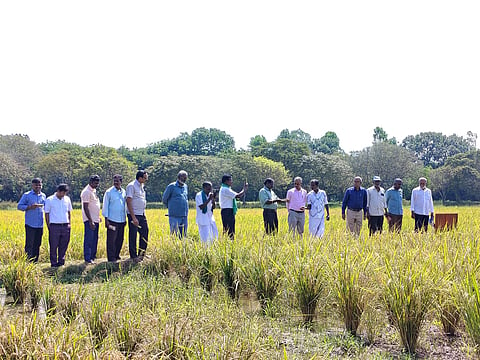

KARAIKAL: At a time when paddy farmers in the delta region fret over the delay in payment of compensation for the damage incurred to their samba and thaladi crop in the unseasonal rains earlier this year, a team of researchers at the Pandit Jawaharlal Nehru College of Agriculture and Research Institute in Karaikal (PAJANCOA&RI) claim that the flood-tolerant varieties they developed have successfully withstood such vagaries of nature during trials. They now advocate for their use among farmers to enable their cultivation to withstand such inclement weather conditions.
Dr S Thirumeni, professor and head, Department of Plant Breeding and Genetics, said, “The crops released by PAJANCOA&RI have exhibited significant tolerance to ‘submergent’ conditions. We encourage farmers to take up cultivation of these varieties in order to withstand future incessant rain spells.” According to the institute, it released the KKL (R) 2 variety in 2022. The variety, which can be cultivated in 135-145 days, can return a yield of 6.8 tonnes/hectare in normal conditions and 3.8 tonnes/ha in flooded conditions. KKL (R) 4, a variety released in 2024, can be cultivated in 120-125 days. Suitable for thaladi season, the variety can yield six tonnes/ha in normal conditions and four tonnes/ha in flooded conditions.
Another variety, KKL (R) 3, which was released in 2023 and is saline-tolerant, can be cultivated in 110-115 days. The variety suitable for kuruvai season can return a yield of 6.5 tonnes/ha in normal conditions and 3.5 tonnes/ha in saline conditions. The varieties were developed under the ‘From QTL to Variety’ project, supported by the Union government.
The project refers to a breeding strategy where Quantitative Trait Loci (QTLs), which are regions of genes associated with a trait, are used to develop improved crop varietie, sources said. Dr A Pouchepparadjou, dean, PAJANCOA & RI, said, “The farmers need to adopt to climate-resilient crop varieties and sustainable farming methods to counter agricultural challenges.” Meanwhile, R Ganesan, Puducherry Additional Director for Agriculture, said, “Our department would recommend the institute’s varieties to more farmers once they are tested and perform well in farmers’ fields.”